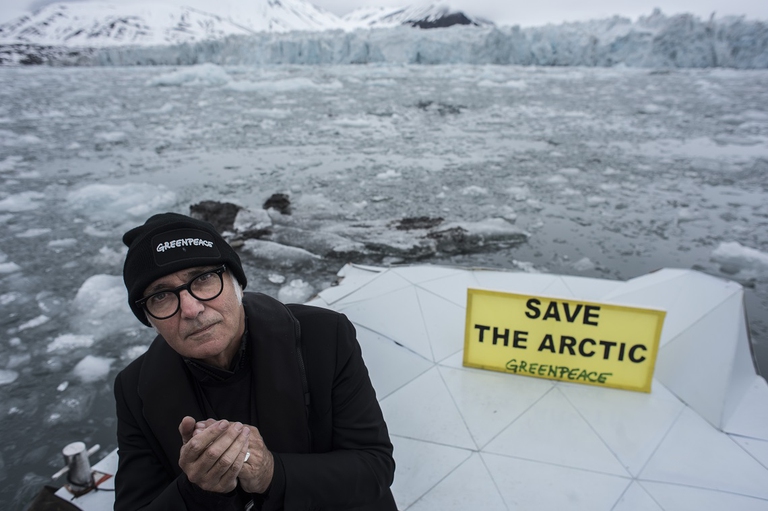
A group of experts in Tokyo suggested pouring radioactive water from Fukushima into the open sea. A marine biochemist explains the consequences of this absurd decision.
Il pianista italiano ha aderito alla campagna di Greenpeace per la difesa dell’Artico e si è esibito in un’insolita performance fra i ghiacci del Polo Nord.
Italian pianist Ludovico Einaudi played a composition dedicated to the cold, majestic Arctic ice, Elegy for the Arctic, on a floating platform.
The extraordinary performance has a great visual and emotional impact, and is part of Greenpeace’s campaign to urge the protection of the Arctic, including through an online petition. The environmental association has long been fighting for protecting this delicate ecosystem, which is threatened by climate change, oil exploitation and overfishing. Einaudi, after boarding Greenpeace’s ship, the Arctic Sunrise, played his sorrowful elegy off the Wahlenbergbreen glacier, in the Svalbard Islands, Norway.
“Being here has been a great experience. The Arctic isn’t a desert, it’s a place full of life,” said Einaudi. “I could see the purity and fragility of this area with my own eyes and interpret a song I wrote to be played upon the best stage in the world. It is important that we understand the importance of the Arctic, stop the process of destruction and protect it.”
The Arctic Ocean is currently the world’s least protected sea. But something could finally change. Over the next few days, OSPAR (the International Commission for the Protection of the North-East Atlantic) will meet and could decide to establish a protected area of over 226,000 square metres in the Arctic Ocean.
Siamo anche su WhatsApp. Segui il canale ufficiale LifeGate per restare aggiornata, aggiornato sulle ultime notizie e sulle nostre attività.
![]()
Quest'opera è distribuita con Licenza Creative Commons Attribuzione - Non commerciale - Non opere derivate 4.0 Internazionale.
A group of experts in Tokyo suggested pouring radioactive water from Fukushima into the open sea. A marine biochemist explains the consequences of this absurd decision.
The decline in grey and humpback whales in the Pacific and Atlantic Oceans has been traced to food shortages caused by rising ocean temperatures.
The United Nations has launched a major international alliance for ocean science, undertaking a mission close to all our hearts.
The cargo ship that ran aground off the coast of Mauritius on 25 July, causing incalculable damage, has split in two and its captain has been arrested.
The largest coral reef in the world is severely threatened by climate change, but researchers are developing strategies that could contribute to saving the Great Barrier Reef.
Seychelles have extended its marine protected area, which now covers over 400,000 square kilometres, an area larger than Germany.
Norwegian oil giant Equinor had pulled out of drilling for oil in the Great Australian Bight, one of the country’s most uncontaminated areas. A victory for activists and surfers who are now campaigning for the area to be protected forever.
30 per cent of the planet needs to be protected to stop precipitous species decline. The UN has set out its aims for the the COP15 on biodiversity scheduled for Kunming, China in October.
Ocean warming has risen to record highs over the last five years: just in 2019 the heat released into the world’s oceans was equivalent to that of 5-6 atomic bombs per second. The culprit, no doubt, is climate change.








